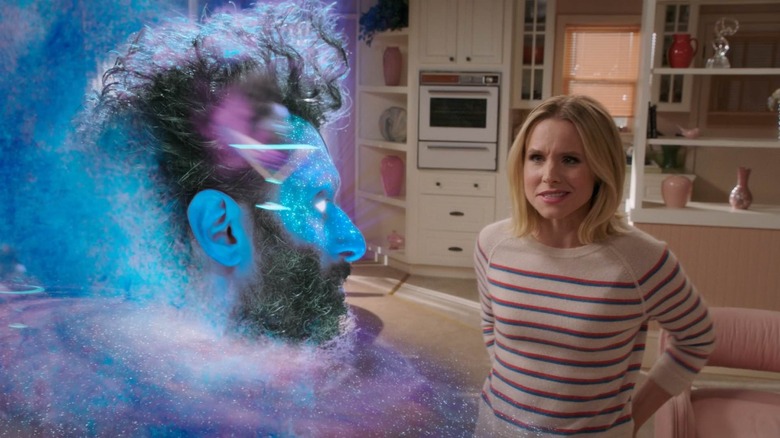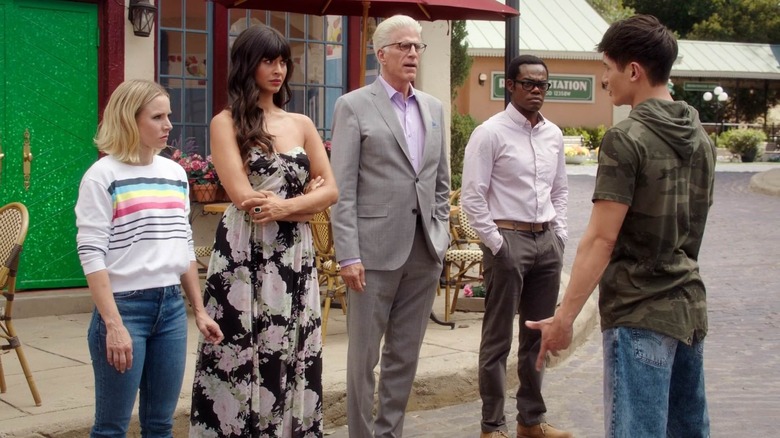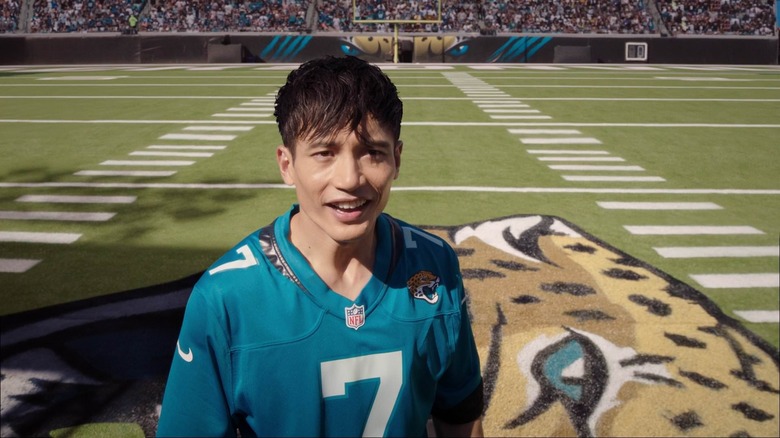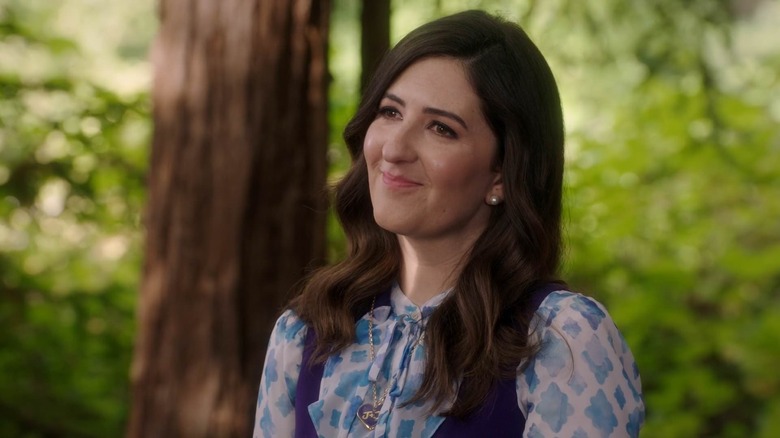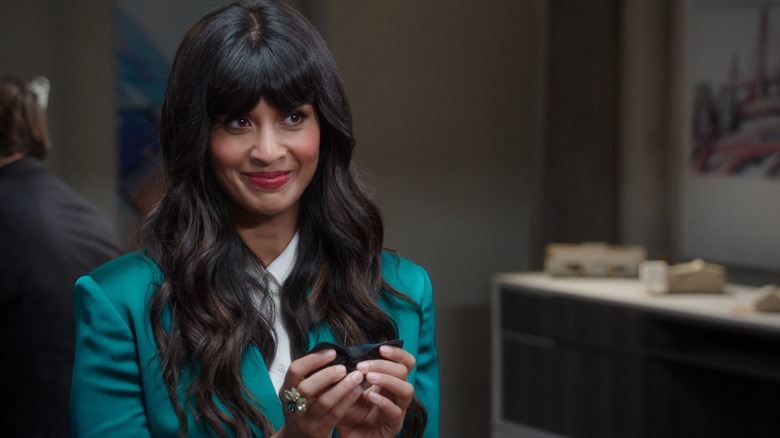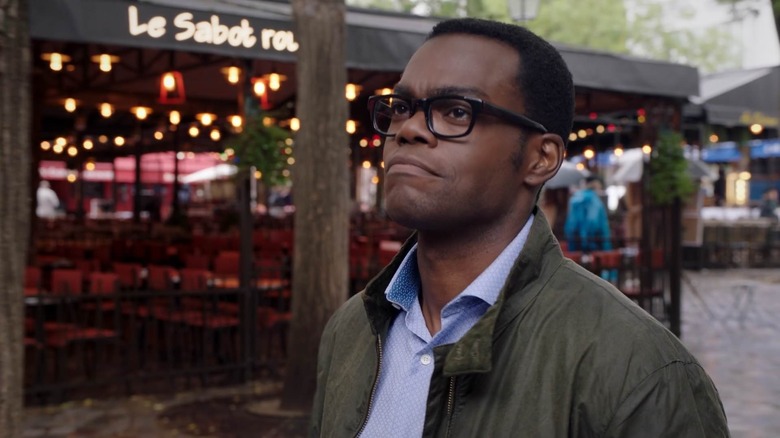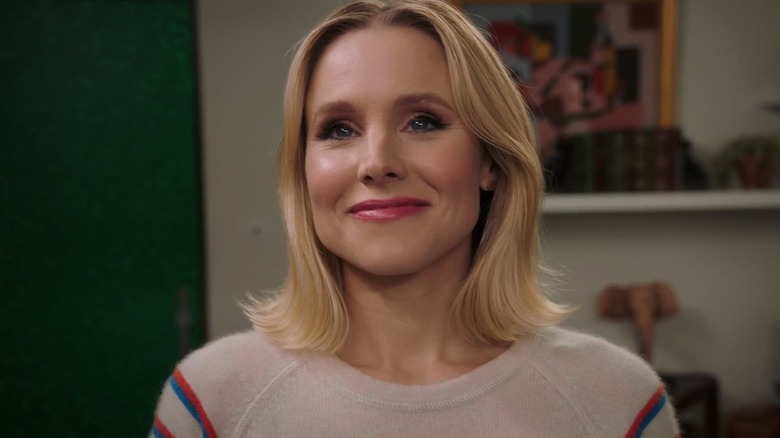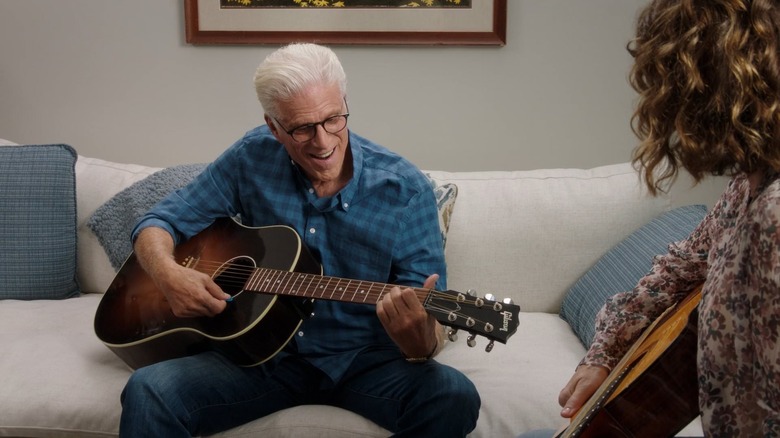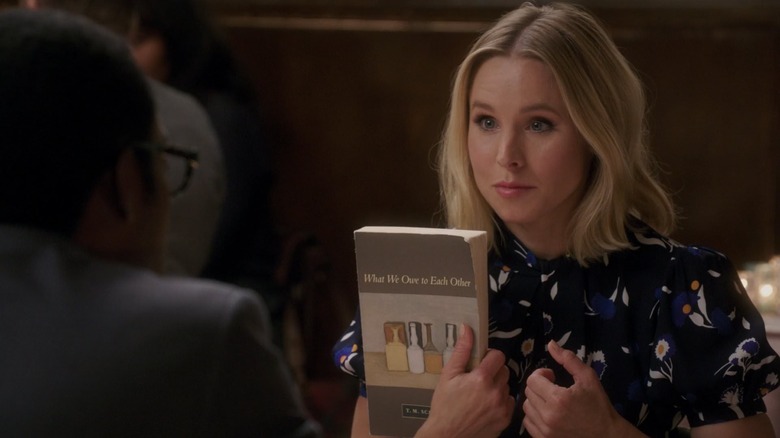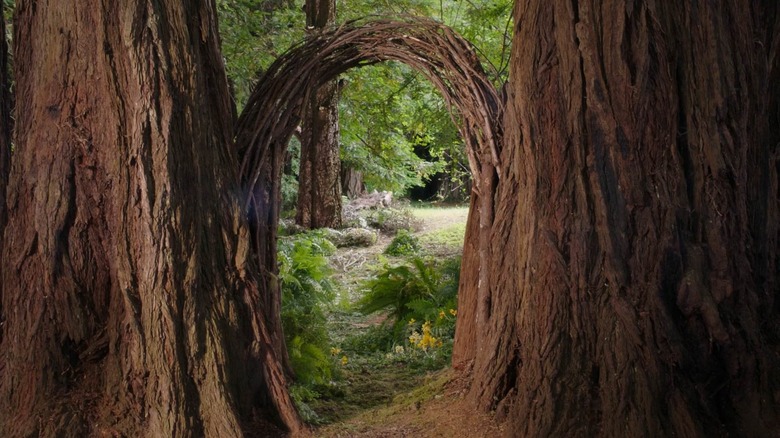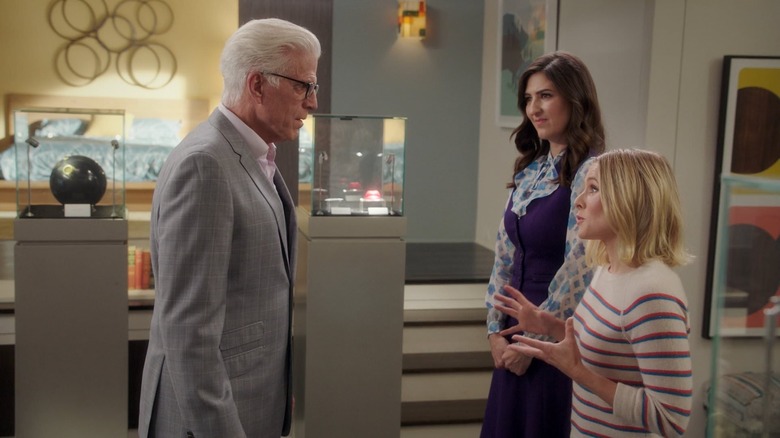The Good Place Ending Explained: Whenever You're Ready
We may receive a commission on purchases made from links.
The premise of NBC's Afterlife sitcom "The Good Place" is simple enough: four recently deceased people find themselves in an idyllic afterlife neighborhood, which "Architect" Michael (Ted Danson) assures them is only for the very best humans. However, Eleanor Shellstrop (Kristen Bell), Chidi Anogonye (William Jackson Harper), Tahani Al-Jamil (Jameela Jamil), and Jason Mendoza (Manny Jacinto) are far from the creme de la creme of humanity. In fact, two are frauds! How did these four make it into the Good Place? Surprise! In the show's biggest "Twilight Zone"-esque twist they're not in the Good Place at all; Neighborhood 12358W is a test project of the Bad Place, and Michael's a demon whose plan was to make them torture each other for a thousand years.
Once Eleanor figures this out, Michael grudgingly gets permission from the head of the Bad Place, Shawn (Marc Evan Jackson), to wipe their memories and try again. But things go wrong almost immediately, and Michael restarts the experiment over 800 times. To avoid a hellish "retirement" and save his own skinsuit, Michael convinces the humans to play along, with the promise that he will figure out how to get them to the actual Good Place. Eventually, his fascination with humanity transforms him into a human supporter and a traitor to his kind. Through major twists and turns — including challenging the entire flawed Afterlife system — the characters save humanity, become truly better people, and confront plenty of philosophical predicaments along the way.
What happened at the end of The Good Place?
In the episodes leading up to the series finale, Michael and the four humans not only prove that the system used to judge humanity is flawed, but also stop Judge Gen (Maya Rudolph) from resetting the Earth to start over. A new Afterlife system is devised, featuring tests designed by Architects from both the Good and Bad Places, where all humans have opportunities to better themselves and reach the actual Good Place. This is so successful that all that's left for the team is enjoy eternity ... leading to the series' final existential crisis: too much of anything becomes a kind of torture, even infinite bliss. So the team convinces Michael to build a "Last Door" through which anyone in the Good Place may step through and cease to exist.
In the one-hour finale, we see how each of the characters faces eternity and, after many Jeremy Bearimys (the timeline structure of the Afterlife), who decides to take the ultimate final step and when. Jason, Chidi, and eventually, Eleanor choose to bid farewell and become one with the universe. Tahani almost goes but decides to continue her existence for a new purpose. Michael, as an eternal demon, could not "end" in the same way until the Judge grants a one-time dispensation for him to go to Earth to live as a human.
This heartfelt finale ranks as one of the series' best episodes, not because of what happens, but why.
Why did Jason choose to exit and then delay leaving?
Simple-minded but emotionally intelligent Jason never seeks meaning or wrestles with existential questions. He simply wants to be with his friends and family, support the Jacksonville Jaguars, eat jalapeño poppers, and play the perfect game of Madden. After finally achieving that perfect game, he realizes he's ready to move on. His last hurrah is a big blowout where he performs a set with his Dance Dance Resolution dance troupe. When Chidi asks how he knows it's time, Jason replies, "It feels like the air inside my lungs is the same outside my body."
The next day, his beloved "not a robot" Janet (D'Arcy Carden) leads him to the threshold of the Last Door and tells him, "You can sit on that bench as long as you want. Whenever you're ready, you just walk through." But Jason becomes distraught over losing the necklace he'd made for her, so she would not forget him. After assurances that she is incapable of forgetting, Janet leaves him at the bench.
Many Jeremy Bearimys later, immediately after Chidi uses the Last Door, Jason reappears, explaining to Janet that he found the necklace and had simply waited for her return. Janet observes that in conquering his impulsive nature he has effectively become the made-up "Jianyu" monk identity he'd been assigned in the experiments. Jason doesn't understand, as usual, but, having given Janet the necklace, he races to the Last Door calling, "Chidi, wait up!"
What happened to Janet?
By her very nature, Janet is truly immortal. Though she and all Janets manifest themselves in human guise, as she says throughout the series, she is "not human, not a girl" and also "not a robot." Whatever she is, she becomes slightly more sophisticated and personable each time she's rebooted, and after over 800 of them, she has become a truly caring individual capable of love. Jason worries that Janet will forget him, but as she possesses all the knowledge in the universe, that's an impossibility. Also, she wont miss any of them because her perception of time differs, and they effectively always remain with her.
In the finale, it was Janet who escorts each of the four to the Last Door, and she also escorts Michael to the Hub and the door to Earth when he becomes human. As such, she is the last to see each one.
Ironically, in the end, it's all-knowing Janet who asks the last philosophical question. "What do you think happens when people walk through the door? It's the only thing in the universe I don't know." To this, Eleanor summarizes what Chidi said before he left: "The wave returns to the ocean. What the ocean does with the water after that is anyone's guess," then adds, "But as a very wise not-robot once told me, 'True joy is in the mystery.'" Janet is left with that mystery, and she's fine with that.
Why did Tahani rescind her plan to go through the Last Door?
Throughout her many Afterlives, Tahani realizes her obsession with proving herself and seeking status had poisoned her existence. As she explained earlier in the season, "If all you care about in the world is the velvet rope, you will always be unhappy, no matter which side you're on."
As the final episode begins, she seems fulfilled, having reconciled with her sister Kamilah (Rebecca Hazlewood) in her last go-round on Earth, and ticking off the final items of her to-do list. Item 11,337 is to spend one meaningful day with her parents. To her and Kamilah's shock, when their cold, distant parents arrive in the Good Place, they are warm and loving, and all is forgiven. At that point, Tahani feels complete.
At her uncharacteristically intimate farewell party, a flirty comment fulfills the final item on her list: "Problematically objectify Eleanor." Then, suddenly she changes her mind, and says, "I'm done here, but I don't want to go there." Having spent her life pretending to help people, she wants to take all she has learned and do it for real. She decides to follow in Michael's footsteps, to be an Architect and design Afterlives.
Michael balks at the idea of a human doing the work of an immortal, but she persuades him. The last we see of soon-to-be-certified Tahani she promises Eleanor she will devise the test for Mindy St. Claire (Maribeth Monroe) to get into the Good Place.
Why did Chidi wait to leave?
Of the four humans, only Chidi made a concerted effort to practice what he preaches and lived his life on Earth as an ethical person, though his endless moral quandaries and chronic indecision ended up hurting people. Facing this Achilles heel in the final season, he insists that his memory be erased to prevent his inability to lie from messing up the final experiment on which humanity's fate rests. In the process he loses his connection to Tahani, Jason, and Michael, and forgets his love for Eleanor. When given his memories back, he finally becomes a decisive person, certain that "Eleanor is the answer."
After the new Afterlife system is in place he enjoys thousands of Jeremy Bearimys with Eleanor. But when he starts reading junk novels, Eleanor sees the writing on the wall. He confesses that he's been ready to go for awhile but held off, knowing she would not accept it. At her insistence, he promises to stay to keep her happy. But realizing her mistake, she frees him from that promise. In their final conversation, he likens existence to a wave in the ocean, "The wave is just a different way for the water to be for a little while."
The next morning at the Last Door, Janet tells him he can sit on the bench there and go through whenever he's ready. But now-decisive Chidi has no second thoughts, bids Janet goodbye, and exits to nothingness.
What did Eleanor need to feel fulfilled?
Eleanor was always the most selfish of the group, and she had traveled a long, hard road to become a better person. By the end, she's learned to make sacrifices for others, often at great personal cost. But that old selfishness resurfaces when she senses Chidi is ready to go, and she insists he stay so she won't be alone. But immediately she realizes what she was asking was unfair, and employs the philosophy Chidi taught her, quoting T.M. Scanlon concerning how we should try to find rules other people can't reasonably reject. Admitting her "Chidi can't leave Eleanor" rule is selfish, she tells him that she owes it to him to let him go.
Following his departure, Eleanor realizes that as the sole inhabitant of the Medium Place, Mindy has no place in the new system. She thinks her final mission might be to convince Mindy to take the test. That accomplished, she still feels unready until Michael futilely tries to end his existence. Now knowing her final task, she petitions the Judge for a one-of-a-kind dispensation for the reformed demon — to become human, live and die on Earth, go through the system, and have the opportunity to choose oblivion.
Finally at peace, Eleanor shares a final chat with Janet, then passes through the Last Door, her energy becoming part of the universe, and a bit of her energy touches a human on Earth, who chooses to do a good deed... for now-human Michael.
Why did Michael try to go through the Last Door?
Like the four humans, Michael goes through a process of self-improvement. His transformation is probably the greatest, evolving from an evil, self-gratifying literal demon to become a kind, gentle being willing to sacrifice himself for those he loves.
But after saving humanity, handing over Afterlife testing to the ambitious Vicky (Tiya Sircar), and adding the Last Door to the Good Place, he's left without purpose when the Joint Council of Afterlife Affairs is dissolved. Rudderless, and with his friends one by one choosing to go through the Last Door, he decides to try to end his immortal existence. But the hard truth is that the Door doesn't work on his kind. He's stuck.
Whether acting as an agent of evil or in humanity's best interests, Michael always had a fascination with humankind. He is occasionally disgusted but more frequently delighted by human foibles and artifacts, and he's giddy at having true human experiences whenever he visits Earth. But he'll never be at peace until he gets the one thing he truly wants: to be an actual human. The Judge makes this possible through Eleanor, and Michael is delighted, despite the risks. He can't know what's going to happen to him, but he's game, saying, "That's what makes it special. I won't exactly know what's going to happen after I die. Nothing more human than that."
What the end of The Good Place means
Ethics are central to "The Good Place," which sprang from — of all things — the coffee routine of creator Michael Shur ("Parks and Recreation," "The Office"). All of the characters grapple with being ethical, especially when it comes at personal cost. Are humans inherently bad, as Shawn insists? Do we expect "moral desserts," or a reward, for acting virtuously? Can acting ethically for selfish reasons eventually lead us to doing them altruistically? The series ending makes the optimistic case that, without the disadvantages that hinder them on Earth and given the right nudge, humans can and will become better and more ethical beings. From beginning to end it's about two simple questions: what do we owe each other? And can we be better? That radical generosity made it one of the greatest modern TV shows.
The finale grapples with the concept that all good things must come to an end, and that nothing should be permanent and forever. As Joel Mayward wrote in Christianity Today, "The sad reality of death nevertheless makes every living experience precious and purposeful; as time-bound creatures, our very fleetingness gives us significance."
Schur told The Hollywood Reporter. "That idea — that paradise is only paradise if it doesn't last forever — has been central to the final episodes and to religious writings for eons before that." He adds, "It's sort of an inescapable conclusion. It doesn't matter how great things are, if they go on forever they will get boring."
Was The Good Place ending controversial?
Yes, the ending of "The Good Place" stirred the pot. Some viewers commented on social media sites, including Reddit, that they were disturbed by the ending portraying the characters choosing to end their existence in a manner that suggested suicide. Others on the same sites argued that the ending was in keeping with the show's rather Eastern philosophical bend where death is concerned, mentioning Buddhist and Hindu thoughts concerning reincarnation, enlightenment, and people working off their karma.
Spencer Kornhaber's article in The Atlantic raised concerns that the show might send the wrong message. "Drawing from some of the most profound teachings of religions around the world, the show made a soothing, seductive, and (thankfully) shaky case for death." The aforementioned Joel Mayward describes choosing the Last Door as "a hybrid of universalism, syncretism, and—to put it bluntly — a type of hereafter suicide."
Even behind the scenes, there was some disagreement over aspects of the ending. "I don't understand why you would think that removing the limit of life would suddenly deprive it of meaning," Pamela Hieronymi, one of the show's two philosophy advisors, told Deseret News. She would have ended the show in the manner Tahani chose, "Let it be this ongoing process of becoming better yourself and then facing the challenges of also helping other people as they come in."
If you or someone you know is struggling or in crisis, help is available. Call or text 988 or chat 988lifeline.org.
What has the cast and crew said about the ending of The Good Place?
Kristen Bell — one of only two cast members who knew the first season's big twist beforehand – told Entertainment Weekly, "There's one line that really sums it up. 'A vacation is only so fun because it has an ending.' If everything were bliss, would everyone be happy? I don't think so. Part of the drive and the passion is why it's the journey, not the destination. And I was very happy with the tough-love ending that happened." People reported Ted Danson saying. "It was a perfect ending to our story ... It was sad but uplifting, kind, gentle and sweet."
"It's devastating, but it's really good, Jameela Jamil told Entertainment Weekly. "I loved the ending of the show, I think it's perfect," she said to ET Online, "I think we ended it at the right place."
Finally, Michael Schur told the Hollywood Reporter, "There's really only one goal ever for a show finale, in my mind, and that's to make people who have been watching the show and invested time and energy and emotion in the show feel like it's a good ending. That's really the only goal. Anything other than that is uncontrollable and unknowable."
